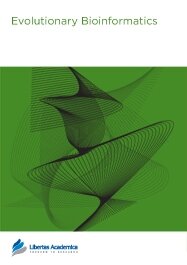

Publication Date: 06 Aug 2012
Type: Original Research
Journal: Evolutionary Bioinformatics
Citation: Evolutionary Bioinformatics 2012:8 449-461
doi: 10.4137/EBO.S9205

The assumption of basic properties, like self-regulation, in simple transcriptional regulatory networks can be exploited to infer regulatory motifs from the growing amounts of genomic and meta-genomic data. These motifs can in principle be used to elucidate the nature and scope of transcriptional networks through comparative genomics. Here we assess the feasibility of this approach using the SOS regulatory network of Gram-positive bacteria as a test case. Using experimentally validated data, we show that the known regulatory motif can be inferred through the assumption of self-regulation. Furthermore, the inferred motif provides a more robust search pattern for comparative genomics than the experimental motifs defined in reference organisms. We take advantage of this robustness to generate a functional map of the SOS response in Gram-positive bacteria. Our results reveal definite differences in the composition of the LexA regulon between Firmicutes and Actinobacteria, and confirm that regulation of cell-division inhibition is a widespread characteristic of this network among Gram-positive bacteria.
PDF (1.03 MB PDF FORMAT)
RIS citation (ENDNOTE, REFERENCE MANAGER, PROCITE, REFWORKS)
Supplementary Files 1 (1.04 MB ZIP FORMAT)
BibTex citation (BIBDESK, LATEX)
XML
PMC HTML
My co-authors and I had a very positive experience with the review and publication process in Evolutionary Bioinformatics. The reviewers were rapid and on point, and publication was also rapid after we made the necessary revisions.

All authors are surveyed after their articles are published. Authors are asked to rate their experience in a variety of areas, and their responses help us to monitor our performance. Presented here are their responses in some key areas. No 'poor' or 'very poor' responses were received; these are represented in the 'other' category.See Our Results
Copyright © 2013 Libertas Academica Ltd (except open access articles and accompanying metadata and supplementary files.)
Facebook Google+ Twitter
Pinterest Tumblr YouTube